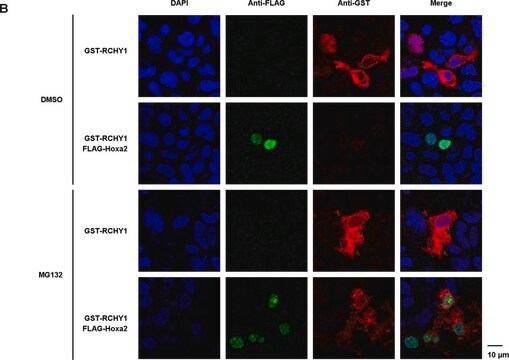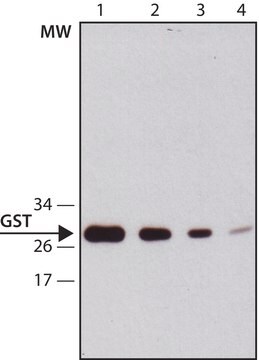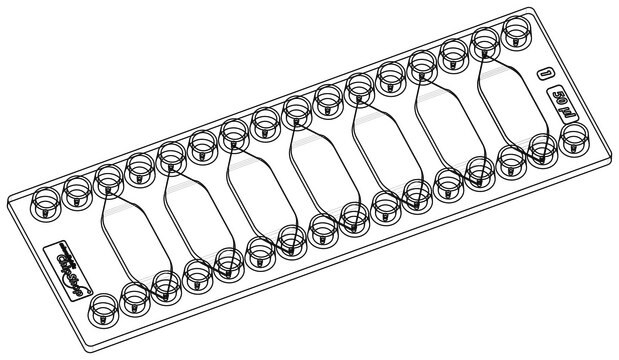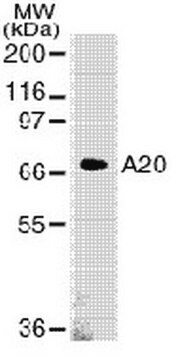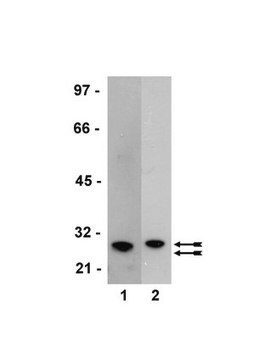推薦產品
生物源
rabbit
品質等級
抗體表格
purified antibody
抗體產品種類
primary antibodies
無性繁殖
polyclonal
物種活性
Schistosoma japonicum, vertebrates
製造商/商標名
Chemicon®
技術
ELISA: suitable
western blot: suitable
NCBI登錄號
UniProt登錄號
運輸包裝
wet ice
目標翻譯後修改
unmodified
基因資訊
human ... GSTP1(2950)
特異性
Anti-Glutathione S-transferase (GST) is a polyclonal antibody to the recombinant glutathione S-transferase (GST) protein from Schistosoma japonicum.
The anti GST antibody reacts specifically with the glutathione S-transferase moiety of GST fusion proteins as expressed in E.coli by the pGEX (1) vectors and in yeast by the pYEX(TM) vectors (2).
(1)The pGEX expression vector system is a plasmid and purification system which, in most cases, results in the fusion protein being soluble in aqueous solutions for extraction and purification from crude bacterial lysates. This expression vector system enables the protein glutathione S-transferase (GST) to be produced in fusion with the protein of interest so as to bind with high affinity to a glutathione affinity column. The GST-protein complex can then be easily purified by elution from the column with reduced glutathione. The pGEX vectors are available as the GST System from Pharmacia Biotech.
(2) pYEX is a yeast GST expression vector supplied by AMRAD biotech of Australia.
The anti GST antibody reacts specifically with the glutathione S-transferase moiety of GST fusion proteins as expressed in E.coli by the pGEX (1) vectors and in yeast by the pYEX(TM) vectors (2).
(1)The pGEX expression vector system is a plasmid and purification system which, in most cases, results in the fusion protein being soluble in aqueous solutions for extraction and purification from crude bacterial lysates. This expression vector system enables the protein glutathione S-transferase (GST) to be produced in fusion with the protein of interest so as to bind with high affinity to a glutathione affinity column. The GST-protein complex can then be easily purified by elution from the column with reduced glutathione. The pGEX vectors are available as the GST System from Pharmacia Biotech.
(2) pYEX is a yeast GST expression vector supplied by AMRAD biotech of Australia.
免疫原
Epitope: S. japonicum form
Recombinant glutathione S-transferase (GST) protein from Schistosoma japonicum.
應用
Anti-Glutathione-S-Transferase Antibody, S. japonicum form is an antibody against Glutathione-S-Transferase for use in ELISA & WB.
Research Category
Epitope Tags & General Use
Epitope Tags & General Use
Research Sub Category
Epitope Tags
Epitope Tags
The anti-GST antibody can be used to detect GST fusion proteins in Western blot analysis and ELISA studies.
外觀
Format: Purified
Liquid in PBS, pH 7.4, containing 0.02% Tween 20 and 0.02% sodium azide as a preservative.
儲存和穩定性
The anti GST antibody is shipped liquid at 4°C. The anti GST antibody is stable for up to 6 months when stored at 2-8°C.
法律資訊
CHEMICON is a registered trademark of Merck KGaA, Darmstadt, Germany
免責聲明
Unless otherwise stated in our catalog or other company documentation accompanying the product(s), our products are intended for research use only and are not to be used for any other purpose, which includes but is not limited to, unauthorized commercial uses, in vitro diagnostic uses, ex vivo or in vivo therapeutic uses or any type of consumption or application to humans or animals.
未找到適合的產品?
試用我們的產品選擇工具.
儲存類別代碼
12 - Non Combustible Liquids
水污染物質分類(WGK)
WGK 2
閃點(°F)
Not applicable
閃點(°C)
Not applicable
分析證明 (COA)
輸入產品批次/批號來搜索 分析證明 (COA)。在產品’s標籤上找到批次和批號,寫有 ‘Lot’或‘Batch’.。
Zhanguang Zhang et al.
The Journal of experimental medicine, 212(12), 2165-2182 (2015-11-11)
DNAM-1 (CD226) is an activating receptor expressed on natural killer (NK) cells, CD8(+) T cells, and other immune cells. Upon recognition of its ligands, CD155 and CD112, DNAM-1 promotes NK cell-mediated elimination of transformed and virus-infected cells. It also has
Shabarni Gupta et al.
Oncotarget, 8(35), 58443-58456 (2017-09-25)
Meningiomas are one of the most common tumors of the Central nervous system (CNS). This study aims to identify the autoantibody biomarkers in meningiomas using high-density human proteome arrays (~17,000 full-length recombinant human proteins). Screening of sera from 15 unaffected
Carolyn Nicole Brown et al.
iScience, 24(10), 103184-103184 (2021-10-21)
The Ca2+/Calmodulin-dependent protein kinase II (CaMKII) is a central regulator of synaptic plasticity and has been implicated in various neurological conditions, including schizophrenia. Here, we characterize six different CaMKIIα variants found in patients with schizophrenia. Only R396stop disrupted the 12-meric
Jun Seop Jeong et al.
Methods in molecular biology (Clifton, N.J.), 723, 213-223 (2011-03-04)
Functional protein microarrays offer a versatile platform to address diverse biological questions. Printing individually purified proteins in a spatially addressable format makes it straightforward to investigating binary interactions. To connect substrates to their upstream modifying enzymes, such as kinases, ubiqutin
Serum Profiling for Identification of Autoantibody Signatures in Diseases Using Protein Microarrays.
Shabarni Gupta et al.
Methods in molecular biology (Clifton, N.J.), 1619, 303-315 (2017-07-05)
Protein microarrays are platforms for studying protein-protein interactions and identifying disease-related self-antigens/autoantigens, which elicit an immune response in a high-throughput format. Protein arrays have been extensively used over the past two decades for several clinical applications. By using this platform
我們的科學家團隊在所有研究領域都有豐富的經驗,包括生命科學、材料科學、化學合成、色譜、分析等.
聯絡技術服務

